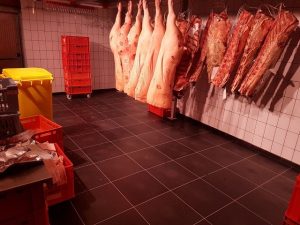Butchery flooring is an essential element in any butcher shop. It is not only used for aesthetic purposes but also plays a crucial role in maintaining the cleanliness and hygiene of the shop.

Types of butchery flooring
Butchery flooring is an important aspect in any meat processing facility. It not only provides a safe and hygienic work environment for the workers, but also contributes to the overall efficiency of the operations. There are various types of flooring materials available for butcheries each with their own unique features and benefits.
Mortar Epoxy Floors
These floors are made by mixing epoxy resin with sand or quartz aggregates, resulting in a thick mixture that is then applied to the floor. They are extremely durable and can withstand heavy traffic and extreme temperature changes.
Terrazzo Epoxy Floors
Similar to gravelled floors, terrazzo epoxy floors also use decorative chips or flakes, but with the addition of marble chips. This creates a luxurious and elegant finish, making it a popular choice for high-end establishments.
Pros and cons of different materials
Each type of flooring material has its own set of advantages and disadvantages. It is important to consider these factors before choosing the right material for your butchery.Epoxy flooring is a durable and long-lasting solution that can withstand heavy traffic and extreme conditions. It is often used in butchery flooring and other areas where hygiene is of utmost importance.
Maintenance and cleaning tips
Proper maintenance and regular cleaning are essential for extending the lifespan of your butchery flooring. Here are a few tips to keep in mind:
- Regularly sweep and mop the floors to remove dirt and debris.
- Use mild cleaning agents and avoid harsh chemicals that can damage the flooring.
- Attend to any spills or stains immediately to prevent them from setting in.
- Use non-slip mats in areas prone to wetness, such as near sinks or refrigerators.
Health and safety considerations
Butchery flooring plays a crucial role in ensuring the health and safety of workers. Here are some factors to consider:
- Choose a material that is slip-resistant and can withstand heavy foot traffic to prevent accidents.
- Regularly clean and disinfect the floors to maintain high levels of hygiene.
- Use proper footwear with good grip for workers to avoid slips and falls.
Cost and installation process
The cost and installation process for butchery flooring may vary depending on the type of material chosen. Some factors to consider include:
Material costs
Material costs are simply what the direct materials cost to manufacture a given product or provide a certain service. Also known as raw material costs or direct material costs these interchangeable terms all describe the cost of integral materials in a product or service.
Installation costs
Installation Costs means all costs actually incurred and paid by Developer to third parties for work performed for the Installation Work as evidenced by invoices receipts contracts and such other evidence of payment and performance of the work as City may reasonably request.
Maintenance costs
Maintenance cost represents all expenses that are the result of your efforts to keep physical assets in optimal working condition. It doesn’t matter if that asset is a car rental property is a generator or a circular saw if it needs regular maintenance it will incur maintenance costs.
Conclusion
Butchery flooring is a crucial aspect of any meat processing facility. It not only affects the safety and hygiene of the work environment but also has an impact on productivity and efficiency. Carefully considering the different types of materials available and maintenance requirements and cost can help you make an informed decision that meets the specific needs of your butchery. So do your research, consult with professionals and invest in high quality flooring for a successful and safe meat processing facility.
FAQs
What are the best materials for butchery flooring?
The best materials for butchery flooring include epoxy rubber concrete and vinyl. Each material has its own pros and cons so it is important to carefully consider your specific needs before deciding on a material.
How often should I clean my butchery flooring?
It is recommended to sweep and mop the floors daily to remove dirt and debris. However, the frequency of deep cleaning and disinfecting may vary depending on the material used and the amount of foot traffic in your facility. Refer to the manufacturer’s guidelines for specific maintenance instructions.
Can I install butchery flooring myself?
It is recommended to hire a professional for installing butchery flooring especially for more complex spaces. Professional installation can ensure the proper preparation and application of the flooring material which is crucial for its longevity and safety. Additionally consulting with professionals can also provide valuable guidance on choosing the right type of flooring for your specific needs.
How important is regular maintenance for butchery flooring?
Regular maintenance is crucial to ensure the longevity and safety of your butchery flooring. This can include repairing any damages, reapplying topcoats and replacing worn out areas. By staying on top of maintenance you can save time and money in the long run.
Are there any specific regulations or codes for butchery flooring?
Yes, it is important to consult with local authorities and building codes when choosing and installing butchery flooring. Some areas may have specific regulations for materials,non slip coatings and other safety requirements. Consulting with a professional can also help ensure that your flooring meets all necessary standards.
